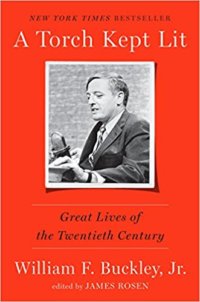A Torch Kept Lit: Great Lives of the Twentieth Century

A Torch Kept Lit: Great Lives of the Twentieth Century. William F. Buckley with James Rosen, ed. New York: Crown Forum, 2016.
James Rosen provides the reader with a selection of obituaries written by William F. Buckley for National Review. The cast of characters memorialized include significant political figures, family, entertainers and artists, friends, and friends who were political adversaries.
It is the last category of friends who were political adversaries that illuminates the significance of this volume. Introducing Buckley’s obituary of John Kenneth Galbraith (published originally in May 2006), Rosen describes having asked in 2013 then-Secretary of State John Kerry if he had ever met Buckley. Kerry replied he had once appeared on Buckley’s television show, Firing Line, and added, “I loved Bill Buckley” (245, Rosen’s emphasis). Rosen followed up by asking why, and Kerry cited Buckley’s friendship with Galbraith: “That’s what’s missing from politics today.”
Buckley’s friendship with Galbraith is instructive at a time when many relationships have become politicized. It seems this politicization has something to do with the exaggerated importance of politics that creeps into all other areas of life, including those areas better regarded as superior to politics, including friendships. To allude to the phrase that Buckley used to make Eric Voegelin popular in political circles, the immanentization of the eschaton makes an absolute out of politics when it should be of lesser worth.
Buckley’s obituary of Galbraith is moving and the reader appreciates Buckley’s admiration of the man while maintaining his criticism of Galbraith’s economic and political views. They seemed to have admired one another’s intellect and seemed to have enjoyed viewing the other as a whetstone for his intellect. Raillery, spirited and competitive verbal jousting, characterized their friendship. I am reminded of Winston Churchill’s love of Lord Birkenhead, the only person whose wit Churchill ever feared. These are examples of Aristotle’s comment that friends of good character “have their rough edges knocked off” (Nicomachean Ethics 1172a17).
Buckley’s criticism and indeed disdain of Galbraith’s political and economic views were leavened a profound admiration of his personal virtues:
“One needs to brush this aside and dwell on the private life of John Kenneth Galbraith. I know something of that life, and of the lengths to which he went in utter privacy to help those in need. He was a truly generous friend. The mighty engine of his intelligence could be marshaled to serve the needs of individual students, students manqué, people who had a problem. Where he would not yield was in intellectual and social perspective” (248).
In not yielding his “intellectual and social perspective,” Buckley identifies Galbraith’s flaw. In identifying Galbraith’s practical wisdom, generous friendship, and (without saying it) charity, Buckley saw the man. One is again reminded of Aristotle, this time his observation that what counts are the choices and actions that human beings make: “by choosing good or bad things we are certain kinds of people, but not by having opinions” (Nicomachean Ethics 1112a2).
Buckley’s obituaries are indeed discerning looks into the moral and spiritual characters of their subjects. One is astounded that of the range of individuals he writes about, how many were his friends: Ronald Reagan, Milton Friedman, Alistair Cooke, Vladimir Horowitz, L. Brent Bozell, Jr., Russell Kirk, Vladimir Nabokov, William Shawn, Rosalyn Tureck, Whittaker Chambers, and David Niven. Other obituaries include those of Dwight Eisenhower, John F. Kennedy, Richard Nixon, his wife Patricia Taylor Buckley, Jerry Garcia, John Lennon, Elvis Presley, Winston Churchill, Princess Diana, Barry Goldwater, Golda Meir, Ayn Rand, and Eleanor Roosevelt. The art of writing obituaries demands great discernment because it demands one to have an insight into the “central fire” (as Bertrand Russell once called his connection with Joseph Conrad) of the individual’s personhood. These obituaries are not only memorials of individuals, but of his friendship with them. They receive their charm and insight from his ability to practice friendship with a wide range of human personalities.
Recalling John Kerry’s comment noted above, one wonders whether someone like a Buckley, with his ability to network and to befriend, could be possible today. As A Torch Kept Lit is as much about Buckley as it is the “great lives of the twentieth century,” one is tempted to conclude with a lament common to obituaries: “we won’t see his kind again”




